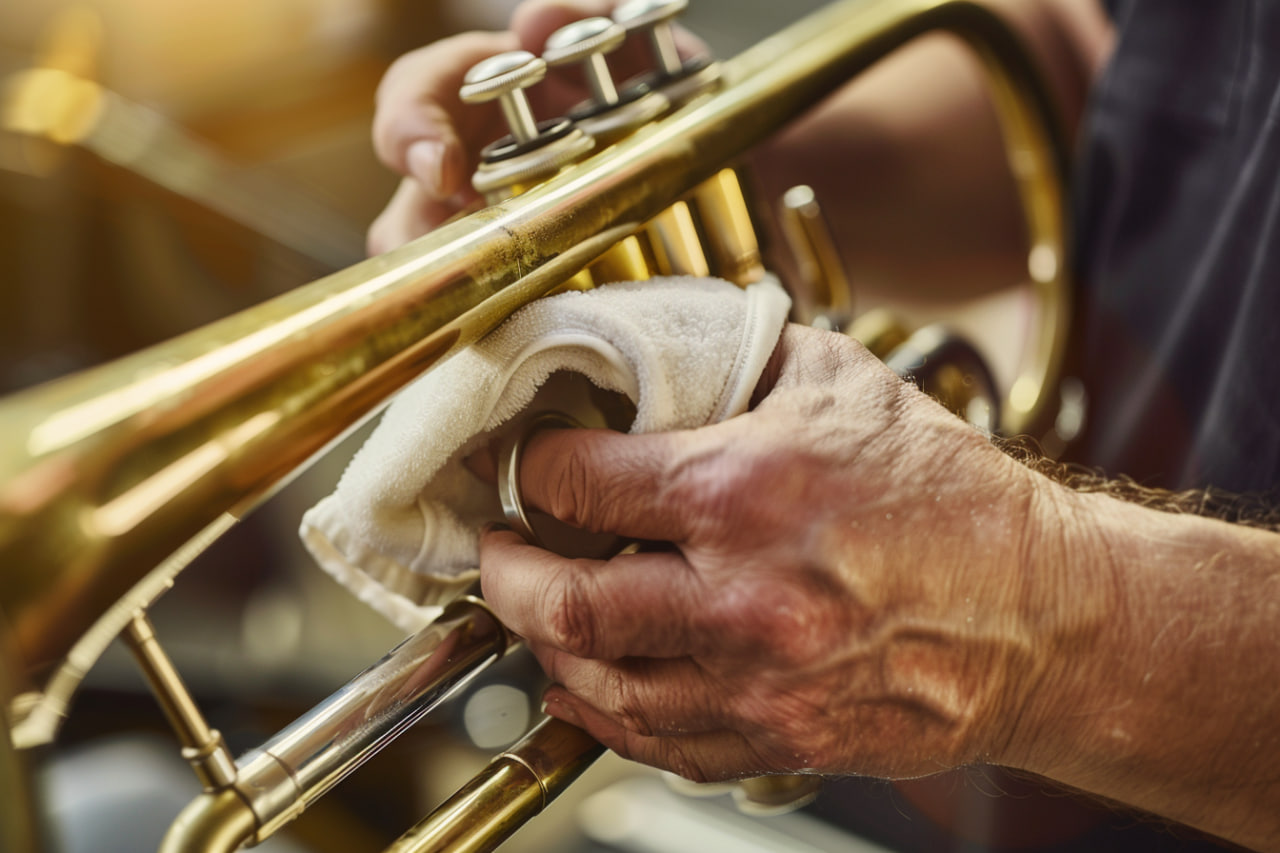How to Care for Trumpets, Trombones, and Other Brass Instruments
There’s something noble about brass instruments. Maybe it’s the golden shine, the bold bell, or the way a single note can fill a room with warmth—or shake it with power. But behind every beautiful brass sound is not just the musician’s breath, but care, cleaning, and a touch of patience.
Brass instruments are sturdy by nature, but not invincible. A dent in the wrong place, sticky valve, or clogged slide can silence even the most talented player. Thankfully, caring for your trumpet, trombone, or tuba isn’t difficult—it’s just about creating a rhythm of respect between musician and instrumen

Brass may be metal, but that doesn’t mean it can handle anything. Like woodwinds and strings, brass instruments are sensitive to temperature, moisture, and time.
➤ Always Use a Hard Case
Brass instruments dent easily. A minor bump against a table leg or doorframe can cause lasting damage to tubing or valve alignment. Keep it in a well-padded, hard-shell case any time it’s not in your hands.
➤ Watch the Weather
Avoid storing your instrument in extreme heat or cold (especially the trunk of a car). Metal expands and contracts with temperature shifts, which can cause slides to stick and valves to jam.
Ideal practice: Let the instrument adjust to room temperature before playing or oiling the valves.
Brass instruments live close to your breath—which means they’re constantly exposed to moisture, oils, and even food particles (gross but true). Regular cleaning helps prevent buildup, corrosion, and unpleasant odors.
➤ Daily: Quick Wipe and Water Dump
➤ Weekly: Valve and Slide Maintenance
Important: Only remove and clean one valve at a time to avoid mixing them up—each valve is numbered and must go back into its original casing.
Yes, your brass instrument deserves a bath—just like you.
1.Fill a bathtub or sink with lukewarm (not hot) water and a small amount of mild dish soap.
2.Disassemble the instrument: remove all slides and valves.
3.Soak everything but the felt or cork parts for 10–15 minutes.
4.Use a snake brush to clean out tubes, a mouthpiece brush for the mouthpiece, and a valve casing brush for the valve chambers.
5.Rinse thoroughly and dry completely before reassembling.
6.Reapply slide grease and valve oil.
Avoid soaking the valves too long or letting felts and pads get wet—they can deform or rot.
Whether you’re heading to rehearsal or flying to a competition, a few extra precautions will keep your instrument safe.
Use mouthpiece caps to prevent dents to the delicate shank.
Never place heavy objects on top of the case, especi ally on buses or planes.
If flying, carry it on if possible. Many trumpets and even some trombones fit in overhead compartments. For large tubas or euphoniums, consider flight cases designed for air travel.
Label your case clearly inside and out, especially if your child is part of a school band with similar-looking cases.
What Not to Do
Don’t eat or drink sugary beverages right before playing. Residue travels from the mouth to the tubing and creates buildup fast.
Don’t use household oils or lubricants (like WD-40!)—they damage metal and rubber parts.
Don’t leave the instrument assembled and lying on a table—always return it to the case after playing.
Clean your mouthpiece weekly with warm water and a brush. If it’s stuck in the instrument, never try to yank it out—use a special tool called a mouthpiece puller (or take it to a repair tech). Force can warp the tubing and make things worse.
In Closing: Care That Honors the Music
Brass instruments are surprisingly personal. Every trumpet, trombone, or horn is shaped not just by its metal, but by the breath that fills it and the hands that hold it. Keeping it clean, smooth, and dent-free isn’t just a chore—it’s a way of saying thank you. Teaching students to care for their brass instrument helps them build responsibility, confidence, and pride. And in return, the instrument stays strong, brilliant, and ready to sing every time they take a breath.